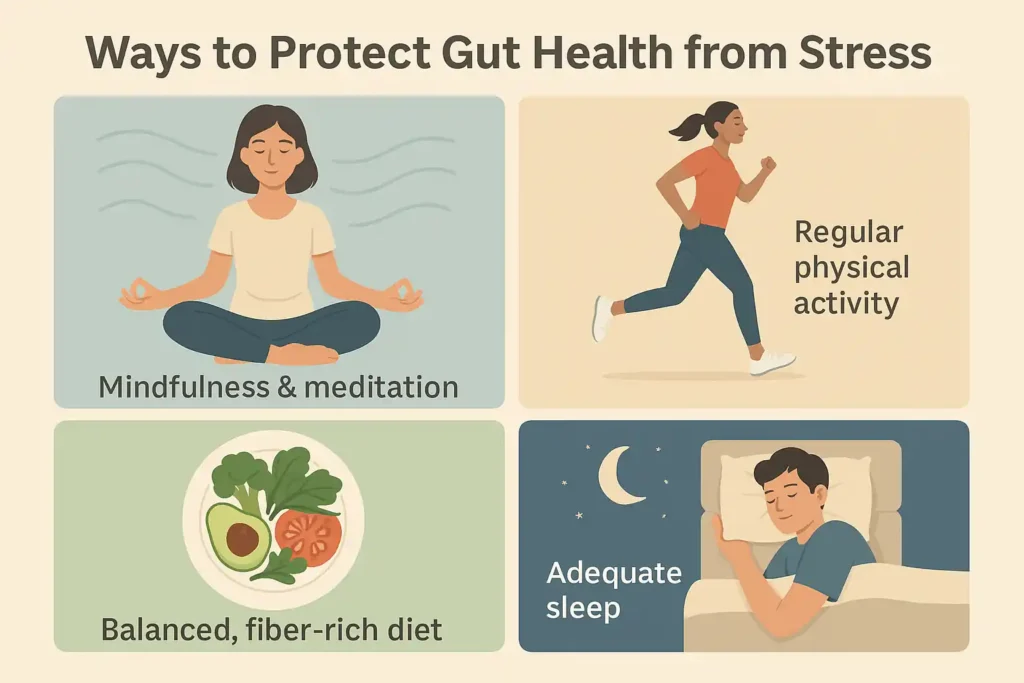Stress and gut health are linked in ways many people don’t realize. If you’ve ever had a stomachache before a big meeting or felt queasy during an argument, that’s proof your gut reacts to your emotions.
Table of Contents
ToggleStress isn’t just in your head, it changes how your digestive system works, how food moves, and even what bacteria live in your intestines. If left unchecked, it can set the stage for bigger health problems.
Understanding the Gut-Brain Connection
Your brain and gut communicate all the time. This “conversation” is what scientists call the gut brain axis. It’s a two-way street; your brain sends signals to the gut, and your gut sends messages back to the brain. And it’s the reason emotions can trigger stomach trouble.
How the nervous system communicates with the gut
Your nervous system controls gut activity through a network of nerves in the digestive tract. When stress hits, the brain sends “fight or flight” signals that change digestion.
Blood flow to the gut drops, muscle movement shifts, and hormone levels spike, all of which disrupt normal digestion. This explains why stress effects on digestive system can appear within minutes.
The role of the vagus nerve
The vagus nerve is the key communication pathway linking your gut and brain. When it works well, it helps digestion run smoothly.
However, long-term stress decreases vagus nerve impulses, which can cause symptoms to worsen and impede or speed up food movement. A weak vagus response is a key reason stress and digestion become so unpredictable.
How Stress Affects Digestion

Stress and digestion are closely linked. When your body senses danger, whether it’s real or just pressure from work, it shifts energy away from your digestive system. This can trigger a chain of problems.
Reduced nutrient absorption
Under stress, your gut struggles to absorb vitamins, minerals, and fats. Over time, this can lead to fatigue, weaker immunity, and dull skin. Poor absorption is one way stress symptoms show up without obvious stomach pain.
Changes in gut motility
Gut motility means how quickly food moves through your intestines. Stress can slow it down, causing constipation, or speed it up, causing diarrhea. Both patterns interfere with nutrient absorption and comfort.
Altered stomach acid production
Stress can increase stomach acid, raising your risk of heartburn, or decrease it, leading to poor digestion and bloating. Changes in acid also encourage harmful bacteria growth, adding to stress and microbiome imbalances.
Stress and the Gut Microbiome
The stress and microbiome connection is strong. Your gut is home to trillions of bacteria, many of which keep you healthy. Stress can disturb this balance.
Disruption of healthy bacteria
Under stress, harmful bacteria may grow faster while good bacteria decline. This imbalance can lead to bloating, gas, and other digestive troubles.
Increased risk of gut dysbiosis
Your gut microorganisms are out of equilibrium if you have dysbiosis. Stress can make this more likely, especially if your diet is low in fiber and high in processed foods.
Effects on immune system function
About 70% of your immune system is situated in your gut. Stress can weaken your immune defenses, making you more likely to get sick. It can also lead to gut inflammation from stress, which may cause ongoing discomfort.
Chronic Stress and Gut Disorders
Long-term stress can lead to chronic stress digestive problems that are hard to ignore.
Irritable bowel syndrome (IBS)
Irritable bowel syndrome is one of the most common gut issues linked to stress. It can cause cramping, pain, bloating, and unpredictable bowel habits. Stress often makes symptoms worse.
Inflammatory bowel disease (IBD)
While stress doesn’t directly cause Inflammatory bowel disease, it can trigger flare-ups in people who already have it. The immune system reacts strongly, leading to inflammation and pain.
Gastroesophageal reflux disease (GERD)
Acid rises into your esophagus when you have Gastroesophageal reflux disease. Stress can make symptoms more frequent and more intense by affecting muscle control in your digestive tract.
Ways to Protect Gut Health from Stress

Good news—there are practical steps to limit stress effects on digestive system and keep your gut healthy.
Mindfulness and meditation
Mindfulness helps you focus on the present moment. Just a few minutes of deep breathing or meditation each day can lower stress hormones. This can support stress reduction for digestive health.
Regular physical activity
Exercise isn’t just for fitness, it helps regulate digestion and boosts mood. Even walking for 20 minutes can improve gut movement and reduce stress.
A balanced, fiber-rich diet
Fiber promotes healthy gut flora and facilitates easy digestion. Aim for fruits, vegetables, whole grains, and legumes. A balanced diet is one of the best natural ways to heal the gut from stress.
Adequate sleep
Sleep is when your body repairs itself. Poor sleep increases stress symptoms and makes digestion sluggish. Aim for 7–9 hours of rest each night.
The Bottom Line
Stress and gut health are connected in powerful ways. When your mind is tense, your gut feels it. Keeping your digestive system healthy requires controlling both physical and mental stress. A calm mind helps keep your gut balanced, your nutrients absorbed, and your immune system strong.
FAQs
What is the gut-brain axis?
The gut-brain axis is the communication network linking your digestive system and brain through nerves, hormones, and bacteria, influencing mood, digestion, and immunity.
How does stress affect the gut?
Stress changes muscle movement, reduces nutrient absorption, alters acid levels, and shifts gut bacteria, leading to discomfort, poor digestion, and increased illness risk over time.
Can stress destroy the gut microbiome?
Stress can disrupt the bacterial balance, reducing good microbes while letting harmful ones thrive. This can cause digestive symptoms, mood changes, and weakened immune defense.
How to heal your gut from stress?
Reduce stress with meditation, gentle exercise, balanced eating, and enough sleep. Limit processed foods and eat fiber to restore healthy bacteria and support digestion.
How long can a stress gut last?
Mild stress-related gut symptoms may last hours or days. Chronic stress can cause ongoing problems that only improve when stress levels are managed effectively.
What are the symptoms of chronic stress?
Common stress symptoms include digestive changes, headaches, fatigue, poor sleep, muscle tension, irritability, and trouble concentrating, often worsening over time without management.
How to improve gut health?
Eat high-fiber foods, drink enough water, stay active, sleep well, and manage stress daily to keep digestion smooth and gut bacteria balanced.
How do I reset my gut health?
Limit processed foods, add probiotics, eat more plants, and manage stress and digestion triggers to restore balance and improve overall gut function.

This article is medically reviewed by Dr. Chandril Chugh, Board-Certified Neurologist, providing expert insights and reliable health information.
Dr. Chandril Chugh is a U.S.-trained neurologist with over a decade of experience. Known for his compassionate care, he specializes in treating neurological conditions such as migraines, epilepsy, and Parkinson’s disease. Dr. Chugh is highly regarded for his patient-centered approach and dedication to providing personalized care.








